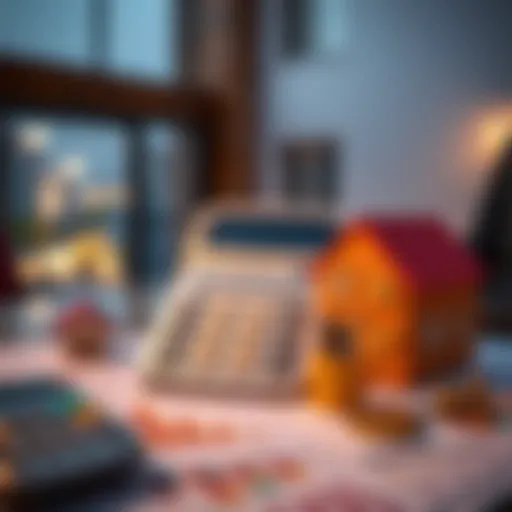Understanding the Impact of Commercial Brokers in Dubai


Market Trends
The real estate market in Dubai is a dynamic stage, bustling with activity and opportunities. As a commercial broker, understanding current market trends is essential to navigating this vibrant landscape. In recent years, Dubai's property market has evolved tremendously, fueled by governmental initiatives, a growing expat community, and an influx of foreign investments. Investors and stakeholders looking to capitalize on these opportunities must be well-versed in these trends.
Current Real Estate Trends in Dubai
One of the most significant factors shaping the market is the ongoing development in infrastructure. Projects like the Dubai Creek Tower and improvements in transportation, including the expansion of the metro system, have enhanced connectivity. This makes certain neighborhoods more attractive to both investors and homebuyers, driving demand for properties. Moreover, the rise of smart homes incorporating modern technology and sustainability practices appeals to a growing base of eco-conscious buyers.
Additionally, the recent reduction in property registration fees has made it easier for individuals and companies to invest in the Dubai real estate sector. This, combined with the emergence of innovative property financing models, is reshaping the landscape, allowing more stakeholders to enter the market.
"Understanding the subtleties of the market is like reading a map without knowing the landmarks. Your commercial broker will help guide you through."
Future Forecasts for the Dubai Property Market
Looking ahead, the future of Dubai's real estate market appears promising, despite global economic fluctuations. The Expo 2020 has set the stage for a surge in demand, and experts believe that this momentum will continue post-expo as well.
Factors including population growth due to job creation in various sectors suggest the demand for both residential and commercial properties will rise. Additionally, projections indicate that rental yields will remain favorable, providing an attractive status for investors seeking long-term returns. Brokers who keep a finger on the pulse of these trends can offer invaluable insights, ensuring that clients make informed decisions.
Property Types
In Dubai, the property landscape is diverse, catering to a wide range of preferences and investment goals. This section provides an overview of key property types.
Residential Properties: Overview and Insights
When discussing residential properties, one must consider various options like apartments and villas located in prime areas such as Dubai Marina and Palm Jumeirah. The luxury real estate sector is particularly vibrant, often appealing to affluent investors looking for second homes or rental properties. The market dynamics here are influenced by foreign interest; expatriates make up a significant portion of buyers, thus creating a competitive market.
The rise in demand for affordable housing options is also notable. Developers are increasingly focusing on creating mid-range properties due to the influx of professionals seeking long-term rentals rather than ownership.
Commercial Properties: Opportunities and Challenges
For commercial properties, the landscape reveals both exciting opportunities and inherent challenges. The demand for office spaces has shifted drastically, with the rise of flexible workspaces due to changing work habits. Coworking spaces and short-term lease options are becoming popular as companies reassess their space requirements. Brokers who have comprehensive knowledge about commercial leasing laws and regulations can effectively guide their clients through this highly specialized sector.
Retail spaces in Dubai also face unique challenges, impacted by the increasing trend of online shopping. However, those that adapt by offering a blend of digital and physical customer experiences can thrive. Brokers can play a crucial role in identifying suitable retail locations that cater to emerging consumer preferences.
Overall, understanding these nuances not only aids brokers in negotiating better deals, but also empowers investors and property agents with the knowledge needed for successful engagements in Dubai's real estate emporium.
Understanding the Commercial Sector in Dubai
The commercial sector of Dubai's real estate market is more than just buildings and sites to rent or buy; it’s a dynamic ecosystem driving economic growth. This sector is key to comprehending not only the operational frameworks within Dubai but also the broader implications for investors, developers, and local enterprises. Understanding this landscape enables all stakeholders to navigate myriad opportunities and challenges faced in this vibrant emporium.
Overview of Dubai's Real Estate Landscape
Dubai's real estate landscape is characterized by rapid transformation and extensive diversity. From upscale office spaces to high-end retail units, the market is bustling with options tailored to a range of business needs. The continuous influx of investors, both local and international, fuels a competitive atmosphere, leading to innovative developments and increasing property values.
In recent years, the Dubai government has enacted favorable regulations and economic incentives aimed at attracting foreign investments, solidifying the emirate's position as a global real estate hub. This wave of investment not only enhances infrastructure but also fosters a harmonious balance between residential and commercial properties.
Types of Commercial Properties
To truly appreciate the role of commercial brokers in Dubai's real estate, we must analyze the various types of commercial properties available in the market. Brokers must be well-versed in these categories to serve their clients effectively. Each type has unique characteristics and merits for different investors.
Office Spaces
Office spaces in Dubai range from small co-working units to sprawling corporate headquarters. They are crucial for establishing a business presence and often represent a measure of success in the corporate world. The modern office environment in Dubai frequently leans toward flexible designs, which suit the diverse needs of businesses today. The prime locations, like Dubai Marina and Business Bay, showcase high foot traffic and accessibility, making them attractive for potential tenants. However, high rental prices can be a disadvantage for startups or smaller businesses looking to establish themselves.
Retail Units
Retail units are pivotal to Dubai's commercial scene, especially given the city's status as a shopping paradise. From flagship stores in luxury malls to small boutiques in bustling souks, these units cater to a vast demographic. Their key characteristic is versatility—accommodating everything from food and fashion to tech and art. One notable advantage of retail units is their potential for high footfall, especially during peak tourist seasons. However, the challenge lies in the fierce competition that can affect profitability.
Warehouses


Warehouses play a critical role in the supply chain and logistics of Dubai's economy. Positioned strategically near transport hubs such as Jebel Ali Port, these properties facilitate smooth operations for businesses that thrive on distribution. Their expansive size and flexible designs are appealing to logistics companies, manufacturers, and e-commerce ventures. The downside, though, may involve zoning regulations that can add complexity to acquisitions and development.
Industrial Zones
Industrial zones in Dubai are essential for fostering manufacturing and production. These areas are often equipped with infrastructure designed to support large-scale operations, such as utilities and logistics services. Investors find these zones attractive due to the regulatory framework that promotes capital investments and encourages development. However, potential buyers may face limitations regarding what types of industries are permitted, which can influence their investment decisions.
Each type of commercial property presents unique prospects and challenges, making the role of brokers essential in navigating this complex landscape.
Ultimately, a clear understanding of the commercial sector in Dubai not only empowers brokers but also reassures buyers and investors of the numerous opportunities to harness their capital effectively.
The Role of Commercial Brokers
In the bustling hub of Dubai's commercial real estate scene, the presence and significance of brokers stretch far beyond mere transaction facilitators. They stand as the linchpins connecting various stakeholders, harmonizing the intricate web of interests that define this vibrant market. As the landscape evolves with globalization and technological advancements, the role of commercial brokers burgeons, necessitating a nuanced understanding of their functions and the competencies they must wield.
Commercial brokers are more than agents; they are the navigators of a complex marketplace, guiding clients through a labyrinth of choices. Their expertise becomes especially pertinent in a city where opportunity and competition whisk around like a whirlwind. Whether it’s negotiating the finest details of lease agreements or spotting emerging trends before they hit the mainstream, brokers offer irreplaceable insights and connections.
Engaging a commercial broker can provide numerous advantages:
- Market Knowledge: They possess an insider’s grasp of the local market, from price fluctuations to emerging neighborhoods, making them invaluable to both investors and entrepreneurs.
- Network Access: Brokers have extensive connections across sectors. They can introduce clients to potential collaborators—including lenders, contractors, and other industry players—facilitating smoother project execution.
- Negotiation Skills: With their trained eye and seasoned experience, brokers adeptly manage negotiations, advocating for clients' best interests while ensuring all stakeholders feel valued.
In concentrating on the role of commercial brokers, we untangle the threads of their myriad functions which serve to enhance the real estate experience for every player involved.
Functions of a Commercial Broker
The functions performed by commercial brokers are as diverse as the properties they handle. At their core, these professionals blend knowledge of the market and interpersonal relationships to facilitate transactions. Their responsibilities encompass a range of tasks:
- Consultation: Brokers assess clients' needs and provide personalized recommendations based on their understanding of the market.
- Market Analysis: They conduct comprehensive analyses, offering insights on property values, local demographics, and economic conditions that may affect investment decisions.
- Property Listings: Brokers compile accurate listings of available commercial properties, ensuring clients only see options that suit their criteria.
- Showings and Tours: They organize visits and tours, providing clients with the opportunity to experience potential properties firsthand.
- Negotiation: A critical function lies in negotiating terms. Brokers mediate conversations to ensure both parties can reach a mutually beneficial agreement.
- Closing Coordination: They facilitate the closing process, ensuring that all legal documents are prepared accurately and that the transaction goes smoothly.
- Post-Sale Support: Brokers often maintain relationships with clients post-sale, offering advice and support as needed, whether concerning property management or future investments.
Navigating these functions requires not just knowledge but an acute awareness of the shifting market dynamics in Dubai.
Key Competencies Required
To thrive in the commercial brokerage landscape, certain competencies stand out as particularly crucial:
- Strong Analytical Skills: A broker must analyze complex data and market trends to advise clients accurately.
- Communication Proficiency: Verbal and written communication allow brokers to convey their insights effectively, whether drafting reports or interacting with clients.
- Negotiation Acumen: Mastering the art of negotiation can make or break a deal and ensures clients' interests are fully represented.
- Networking Ability: Building and maintaining professional relationships is essential in a fast-paced market where connections often lead to opportunities.
- Market Literacy: An in-depth understanding of the local and global real estate landscape equips brokers with the knowledge to advise clients proactively.
- Technological Proficiency: Familiarity with various tools for data analysis, marketing, and customer relationship management enhances a broker's efficiency and effectiveness.
Ultimately, the blend of these competencies shapes how successfully a broker can operate within Dubai's commercial real estate ecosystem.
"In a market as dynamic as Dubai, a broker is not just an advisor; they become your trusted ally in navigating complexity."
Market Trends in Dubai's Commercial Real Estate
Understanding the trends shaping Dubai's commercial real estate market is crucial for anyone involved in the industry. As the emirate continues to develop at breakneck speed, those looking to invest or operate in this landscape must stay ahead of the curve. With its unique characteristics and rapid growth, the market presents plentiful opportunities and some noticeable challenges.
Current Developments
Dubai stands as a beacon of ambitious real estate projects, each aiming to cater to both local and international markets. Recent developments range from luxury mixed-use projects to high-tech office buildings in key districts like Dubai Marina and Downtown Dubai. This evolution isn't merely about aesthetics; it reflects a demand for sustainable design and functionality.
For instance, the Dubai Creek Harbour is not just enhancing the skyline but also aligning with the sustainability goals set by the UAE government. Mixed-use spaces that combine residential, retail, and office facilities are increasingly common, which means users have everything they need in one location.
Some noteworthy projects include:
- The Dubai Mall expansion: This will add more retail and leisure options, tapping into the growing trend of integrated commercial experiences.
- Dubai South: Aimed at fostering connectivity with global markets, this massive development focuses on logistics and trade, influencing commercial space requirements.
Investors and brokers must monitor these developments closely. Properties in prime locations, like the newly developed Dubai Design District, are not only popular among investors but also attract high-demand clients seeking innovative spaces.
Impact of Economic Factors
Economic climate plays a pivotal role in shaping market trends in Dubai's commercial real estate. The fluctuations in oil prices, economic diversification efforts, and international events all connect to the real estate market. The recent push towards a knowledge-based economy and tourism draws more businesses to Dubai.
High-profile global events, like Expo 2020, have spurred developments and increased investor interest significantly. Despite the pandemic's challenges, the influx of foreign investments has been robust, leading to a rapid rebound in rental yields and property values. The rising awareness of e-commerce and business adaptability is also fueling demand for flexible commercial spaces.
Furthermore, the ongoing regulatory reforms by the Dubai government support foreign investment by offering long-term residency options and 100% business ownership for expatriates. This has a direct impact on the commercial property sector, encouraging businesses to establish a more permanent presence in Dubai.
"Navigating these volatile economic waters demands not only quick decision-making but also strategic foresight at every turn."


Challenges Faced by Commercial Brokers
The real estate sector in Dubai is a vibrant and dynamic market, but it’s not without its own set of challenges, particularly for commercial brokers. Recognizing these challenges is crucial for relevant stakeholders, as it sheds light on potential risks and obstacles, ultimately guiding decision-making. Brokers serve as the bridge between investors and property options; understanding what they face helps build a clearer picture of the industry’s functionality and its areas for improvement.
Regulatory Hurdles
Navigating the regulatory landscape in Dubai can be quite the labyrinth for commercial brokers. The government has placed numerous regulations to safeguard the market and investors, which can sometimes feel like running a marathon with hurdles. Brokers must keep abreast of local laws and compliance requirements, including licensing, zoning, and property rights. These regulations can vary significantly between different emirates and can change quite frequently.
For instance, a broker might find themselves needing to redo contracts or permits if they’re not completely aligned with the new regulations. This not only wastes time but also adds layers of complexity to transactions that are already intricate by nature. Moreover, failure to adhere to these regulations can lead to severe penalties or even losing the ability to operate legally.
Investors who want to engage in Dubai's commercial real estate must rely heavily on brokers who have a solid understanding of these regulations. As such, remaining compliant is not just a personal challenge for brokers, but also a matter of trust and credibility in the eyes of their clients. Brokers must devote significant time and resources to ensure they are fully informed and compliant with the law, impacting their overall efficiency and effectiveness.
Competition and Market Saturation
With the sun shining on Dubai, it’s no surprise that the commercial real estate market has attracted a flurry of brokers eager to carve out their own niche. This increase in professionals can lead to fierce competition; however, the problem only intensifies when coupled with market saturation. It becomes a game of survival—who will secure clients first and keep them loyal?
Brokers must continuously find innovative ways to differentiate themselves from their peers. The competition isn’t just about closing deals; it's also about offering unparalleled service and understanding. As more players enter the field, it becomes vital for brokers to harness their unique selling points—be it market knowledge, network connections, or niche expertise.
Sometimes, brokers may find themselves caught in a pricing war, where competing on commissions could seriously undermine their income potential. It is crucial for brokers to strike a balance between being competitive while still providing value to their clients. This balancing act can be daunting, particularly in a framework as volatile as Dubai’s real estate.
Additionally, new technologies and platforms have emerged that allow clients to access information more readily, making brokers' roles more challenging. A broker’s ability to adapt to these market dynamics—while still providing individual attention and tailored advice—can play a significant role in their success or failure.
In summary, regulatory hurdles and the saturation of the market are both significant challenges faced by commercial brokers in Dubai. Brokers must navigate these issues with care, ensuring that they are not only compliant but also proficiently addressing client needs against a backdrop of competition. Understanding these factors is crucial for both brokers and investors as they seek to thrive in this vibrant but challenging landscape.
Collaboration with Investors
In the fast-paced world of Dubai's real estate market, fostering collaboration with investors stands as a cornerstone for success—no two ways about it. For commercial brokers in Dubai, understanding the needs and motivations of potential investors can mean the difference between sealing the deal or watching opportunities slip through their fingers.
Why Collaborate?
Collaboration serves not just as a transactional tool but as a bridge that connects brokers with investors, paving the path for mutual benefit. Investors come with their own set of goals, expectations, and limitations, which make understanding these factors paramount.
Furthermore, when brokers form robust partnerships with investors, they can cultivate trust. Trust is crucial; without it, the likelihood for long-term relationships diminishes. Brokers can provide invaluable insight and localized knowledge to help investors make informed decisions, ultimately benefiting all parties involved.
"The only way to do great work is to love what you do." - Steve Jobs
This resonates deeply with brokers as they must understand that their role goes beyond simple facilitation; they need to invest time in learning about the specific needs of each investor.
Understanding Investor Needs
When it comes to comprehending investor needs, one simple truth applies: one size does not fit all. Each investor arrives with a peculiar set of financial objectives and risk appetites. Some investors may be looking for long-term, stable returns, while others might seek high-risk, high-reward ventures.
To grasp these needs fully, brokers can adopt several strategies:
- Conduct Thorough Research: Start by researching the profiles of potential investors. Knowing their background, preferred sectors, and investment history can provide insight into their preferences.
- Engage in Direct Dialogue: There’s nothing like a good old-fashioned conversation to get to the heart of the matter. Ask open-ended questions that allow investors to share their desires and concerns.
- Utilize Surveys and Questionnaires: An often-overlooked method, but surveys can yield quantifiable data that encapsulates common investor interests and areas of concern.
By understanding these needs, brokers can tailor their offerings and recommendations, leading to better investor satisfaction and successful transactions.
Effective Communication Strategies
The bedrock of any fruitful collaboration lies in strong communication strategies. In an environment like Dubai, brokers must fine-tune their communication methods to resonate with a diverse pool of investors, many of whom may come from different cultural backgrounds.
Key Strategies for Effective Communication:
- ** Leverage Technology**: Tools like Zoom or Slack can facilitate immediate communication, making interactions flexible and efficient.
- Be Clear and Precise: Avoid jargon or overly complex theories. Instead, utilize straightforward and relatable language to make information accessible.
- Regular Updates: Keep investors in the loop. Regular updates about market trends, investment opportunities, and regulatory changes can go a long way in building trust and rapport.
- Body Language Matters: In face-to-face meetings, non-verbal cues can confirm your engagement and interest. A firm handshake or maintaining eye contact can reinforce your sincerity.
With these strategies, brokers can ensure that their lines of communication remain open and effective. Ultimately, it creates an atmosphere where investors feel valued and heard.
As the landscape of Dubai's commercial real estate continues to evolve, the collaboration between brokers and investors will remain a vital factor in navigating challenges and seizing opportunities.
Case Studies of Successful Transactions
Analyzing successful transactions offers valuable insights into the practices and strategies that lead to favorable outcomes in Dubai's commercial real estate market. Case studies can serve as a roadmap, pointing out both victories and pitfalls in the industry. They contribute essential knowledge not only for commercial brokers, but also for investors who aim to navigate the bustling real estate landscape. Emphasizing the lessons learned from these experiences enhances decision-making, potentially transforming future investments into more lucrative ventures.


High-Profile Deals
High-profile deals often capture attention due to their scale and complexity. For instance, the recent acquisition of a prominent office tower in the Dubai International Financial Centre (DIFC) by a foreign investment group exemplifies the type of transactions that bolster the city's real estate standing. This deal, valued in the hundreds of millions, was facilitated by a commercial broker who not only understood the market dynamics but also maintained excellent relationships with regulatory entities and other stakeholders.
Several factors came into play:
- Market Knowledge: The broker had extensive data about vacancy rates and rental trends, informing the investors' strategy.
- Negotiation Skills: In a competitive landscape, having a skilled negotiator can make all the difference in finalizing terms that benefit both seller and buyer.
- Networking: Established connections within the local market can lead to exclusive opportunities, often before they hit the mainstream market.
Such transactions don't just reflect financial gain; they embody the growing confidence in Dubai's commercial sector, showcasing how strategic partnerships and thorough market understanding yield fruitful results.
Lessons Learned
From analyzing high-profile deals, one can extract several lessons:
- Due Diligence is Non-Negotiable: Investors must conduct exhaustive research before committing to a purchase. This includes understanding the macroeconomic factors driving the market.
- Leverage Local Expertise: Working with brokers who have insider knowledge of local regulations and market trends can uncover unique insights that might be missed otherwise.
- Adaptability to Market Changes: The commercial real estate sector is ever-evolving, influenced by economic fluctuations and evolving investor preferences. Remaining adaptable is vital.
- Strong Communication: Maintaining clear lines of communication between all parties simplifies complex negotiations and ensures that all stakeholders are on the same page.
Future Outlook for Commercial Brokers in Dubai
The future for commercial brokers in Dubai's bustling real estate scene presents a fascinating tableau of potential growth and development. As Dubai continues evolving into a global business hub, this segment of the market will see a flurry of changes. It's crucial for brokers not just to adapt, but also to anticipate shifts that could impact their operations and client interactions.
The ongoing influx of foreign investment and the diversification of the economy, driven by factors such as Expo 2020, indicates multiple avenues for commercial brokers to explore. Being proactive and aware of upcoming trends can create lucrative opportunities, making them invaluable assets to investors and developers alike.
Key Elements to Consider:
- The integration of sustainability in commercial properties.
- Evolving tenant expectations due to a shift towards flexible workspaces.
- Increased competition, necessitating differentiation strategies.
Understanding these elements will not only enhance the brokers' service offerings but also ensure they stay relevant in a dynamic landscape.
Anticipated Market Changes
Anticipating market changes in Dubai's commercial real estate sector requires a keen sense of observation and an analytical mindset. A few anticipated changes that might reshape the role of commercial brokers include:
- Shift Towards Sustainable Buildings: There is a growing emphasis on green buildings that meet sustainable standards. Brokers must familiarize themselves with eco-friendly property options and regulations governing this trend.
- Demand for Flexible Office Spaces: As companies reassess their need for office spaces in light of remote work, there is likely to be a surge in demand for co-working environments. Brokers should react accordingly, providing clients with options that meet these expectations.
- Technological Integration in Transactions: More transactions might happen digitally, requiring brokers to leverage technology effectively—think virtual tours and online closing processes.
The significance of these shifts cannot be overstated. Brokers who take the initiative to adapt to these anticipated changes will likely find themselves ahead of the curve.
Emerging Technologies and Their Impact
As market conditions morph and expectations transform, technology emerges as a cornerstone of progress. Here are some key technologies reshaping the landscape for commercial brokers:
- Artificial Intelligence (AI): Predictive analytics can assist brokers in identifying market trends and better understanding consumer behaviors. This can lead to more personalized service offerings and targeted marketing strategies.
- Blockchain Technology: This innovation enhances transparency in transactions, feeding into the growing demand for secure dealings. Brokers must familiarize themselves with blockchain applications to stay competitive.
- Virtual Reality (VR) Tours: These enable potential clients to experience properties without being physically present, offering a remarkable competitive edge. Brokers who can utilize VR technology to showcase spaces effectively will likely capture interest faster.
"Staying abreast of technological developments can empower brokers to expand their client base while reducing inefficiencies in the sales process."
With the advent of these technologies, commercial brokers in Dubai will not just be facilitators but also tech-savvy advisers equipped to navigate the complexities of an evolving market landscape. They must embrace lifelong learning to keep up with these innovations and enhance their overall effectiveness in aiding clients.
Culmination
The topic of conclusion in this article sheds light on the profound influence that commercial brokers have within Dubai's expansive real estate market. As the backbone of transactions, brokers ensure that the buying, selling, and leasing processes operate smoothly, matching sellers with poised investors. Their expertise culminates into a crucial asset for various stakeholders involved, whether they are large-scale developers or individual investors seeking lucrative opportunities.
By synthesizing prior sections, the importance of brokers is outlined through several key elements. First, they possess an intricate understanding of market dynamics and local regulations, enabling them to guide clients through the often labyrinthine environment of property deals. They bridge gaps between buyers and sellers, facilitating negotiations that can mean the difference between substantial profit and loss.
Moreover, brokers serve as interpreters of market trends. Their ability to provide insights into shifts—ranging from demand for office spaces to fluctuations in rental prices—is essential for informed decision making. Commercial brokers are akin to navigators, steering their clients through both expected tides and uncharted waters in the quest for lucrative investments.
Summary of Key Points
- Brokers’ Transactional Role: They are instrumental in facilitating smooth operations in buying, selling, and leasing properties.
- Market Knowledge: Their comprehensive knowledge about regulations and market trends empowers clients to make sound decisions.
- Networking: Brokers establish vital connections among various stakeholders, enhancing opportunities for successful transactions.
- Negotiation Skills: Their proficiency in negotiation can lead to better terms and conditions for their clients.
- Support Throughout the Process: From initial contact to final sale, brokers guide their clients, providing essential support and resources.
Final Thoughts on the Brokerage Profession
The brokerage profession within Dubai's commercial real estate sector is not merely about transactions but about fostering relationships and establishing trust. It takes a blend of skills—market awareness, interpersonal communication, and negotiation finesse—to navigate the competitive landscape effectively.
As the city evolves and new trends emerge, the adaptability of brokers will be vital. These professionals must be prepared to embrace technology and innovative practices, enhancing their service offerings. The integration of virtual tours and digital platforms in real estate dealings is on the rise, and savvy brokers will leverage these advancements to stay ahead.
In summary, the role of commercial brokers in Dubai transcends the conventional facets of sales. They embody the spirit of the market—dynamic, multifaceted, and essential. This profession represents a gateway, not only to properties but also to opportunities that can shape the economic landscape of Dubai for years to come.















